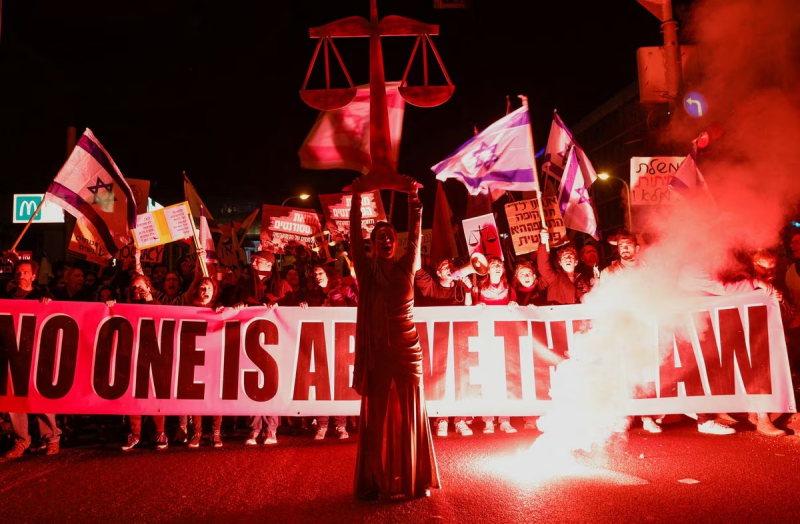
People hold a banner during a protest against Israel's Prime Minister Benjamin Netanyahu's new right-wing coalition and its proposed judicial reforms to reduce powers of the Supreme Court in Tel Aviv, Israel February 11, 2023. (Credit: Amir Cohen/Reuters)
JERUSALEM — The Israeli parliament was set to hold a first reading on Monday of judicial reforms promoted by Prime Minister Benjamin Netanyahu's religious-nationalist government – opponents took to the streets in protest.
Wielding 64 of the Knesset's 120 seats, Netanyahu looked likely to win eventual ratification for the two bills, one an amendment of a quasi-constitutional "basic law" on the justice system and the other overhauling a selection system for judges.
The political opposition, dominated by centrist and secular parties, has sought to slow the process in often-acrimonious parliamentary review sessions. They have also encouraged the weekly mass demonstrations that have spread in major cities.
Polls have found that most Israelis want the reforms slowed to allow for dialogue with its critics or shelved altogether.
Ahead of the afternoon reading in the plenum, protesters posted online videos of themselves trying to prevent lawmakers from Netanyahu's coalition from leaving for the Knesset in Jerusalem. Police said eight people were arrested for disorderly conduct and traffic was rerouted after demonstrators blocked some roads.
"Demonstrators who talk about democracy are themselves bringing about the end of democracy when they deny elected delegates the fundamental right in a democracy [to vote]," Netanyahu said in a statement.
The government says the reforms are designed to end overreach into politics by an unrepresentative Supreme Court.
Critics say, Netanyahu, who is on trial on graft charges that he denies, wants to curb Supreme Court oversight of legislation and to give the executive more sway in appointing judges.
Opposition leader Yair Lapid tweeted that demonstrations, which have been amplified by economists' warnings of investor flight, would culminate "in the fight for the soul of the nation".
But Lapid echoed Netanyahu's condemnation of protesters who were seen in online video footage telling a coalition lawmaker, Tally Gotliv, that she could not take her autistic daughter out of their home. By mid-morning, Gotliv had arrived in the Knesset.
"The more we hear calls here for bloodshed, God forbid, for public disorder, for a civil war...such are the words we are hearing here, it carries a price," she told fellow lawmakers.
Israel's head of state, President Isaac Herzog, has repeatedly urged the government and opposition to hold compromise talks.
But while both sides have voiced willingness, they disagree on terms.